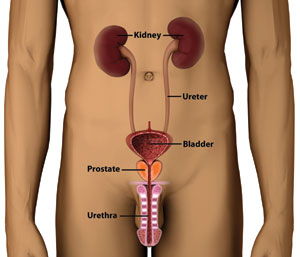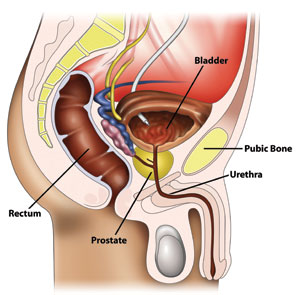Benign prostatic enlargement occurs due to an imbalance of hormones and cell growth in the body. Find out what its causes and symptoms are by the Department of Urology at Singapore General Hospital.
What is benign prostatic enlargement?

The prostate is a plum-sized gland located in front of the rectum, just below your bladder where urine is stored. The prostate gland surrounds the urethra, which is the canal through which urine passes out of your body. The urethra also secretes fluid that forms part of semen.
The prostate gland often enlarges with age. This condition is known as benign prostatic enlargement (BPE), benign prostatic hyperplasia (BPH) or benign prostatic hypertrophy.
As the prostate enlarges, its capsule (layer of tissue surrounding it) stops it from expanding outwards. This causes the prostate gland to press inwards against the urethra like a clamp on a garden hose.
As a result, the bladder wall thickens and the bladder contracts even with small amounts of urine, causing more frequent urination. Eventually, the bladder weakens and loses the ability to empty itself, resulting in residual urine left in the bladder.
Causes of BPE

Benign prostatic enlargement occurs because of a complex interaction between the male hormone dihydroxytestosterone (DHT, active component of testosterone), small amounts of oestrogen (female hormone), and other growth factors.
This results in an imbalance of cell growth and death, and subsequent prostate growth and enlargement.
Risk factors
Increasing age is a risk factor for BPE.
There is no convincing evidence that your diet or lifestyle are risk factors for the condition.
Symptoms
If you have BPE, you may experience symptoms that include :
- a hesitant, interrupted, weak urine stream
- urgency and leaking or dribbling of urine
- more frequent urination, especially at night
Some men with greatly enlarged glands have little obstruction and few symptoms. Others, whose glands are less enlarged, may have more blockage and greater problems.
Sometimes you may not know you have any obstruction until you suddenly find yourself unable to urinate at all. This condition, called acute urinary retention, may be triggered by taking certain cold medications that prevent the bladder opening from relaxing and allowing urine to empty.
Severe BPE can, over time, cause serious problems such as urinary tract infections, bladder or kidney damage, bladder stones, and incontinence. If your bladder is permanently damaged, treatment for BPE may be ineffective. If BPE is found in its earlier stages, your risk of developing such complications is lower.
Read on to learn about how benign prostatic enlargement can be diagnosed and treated.
